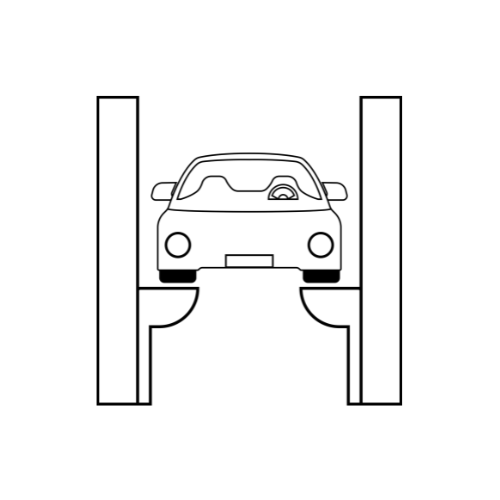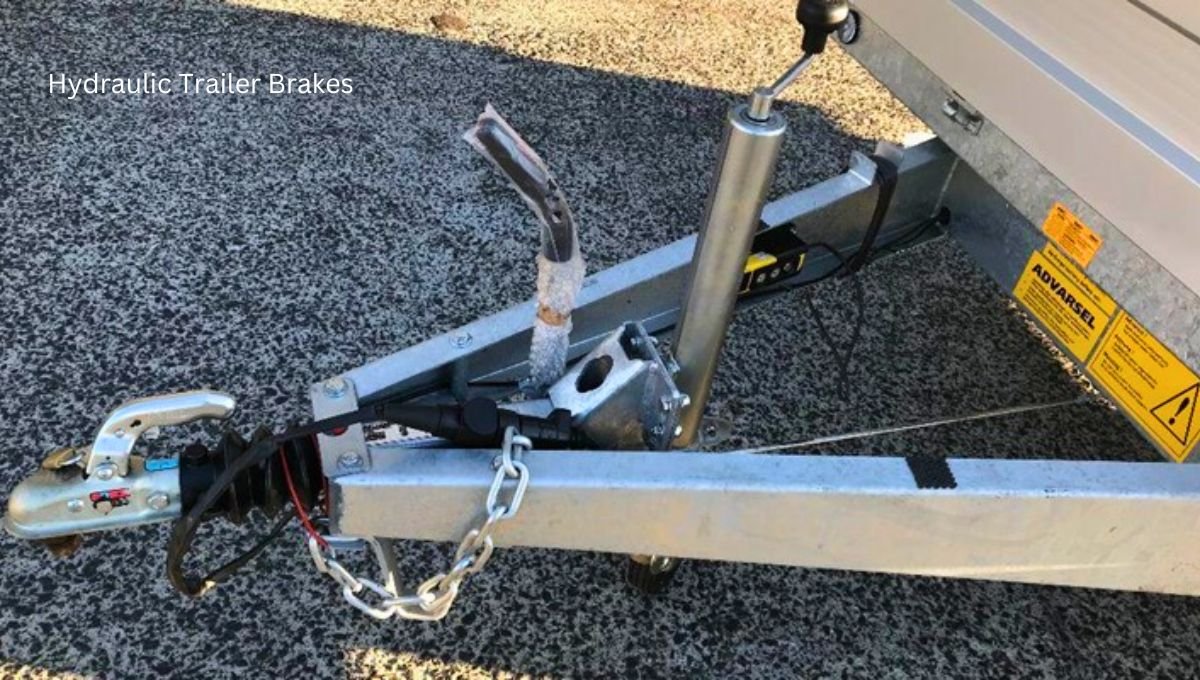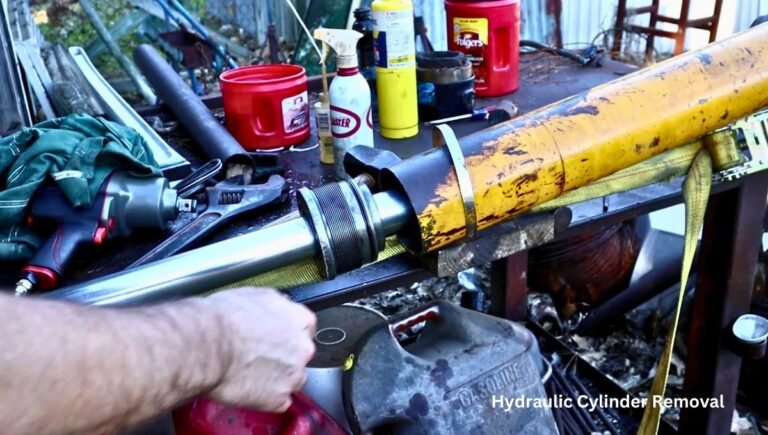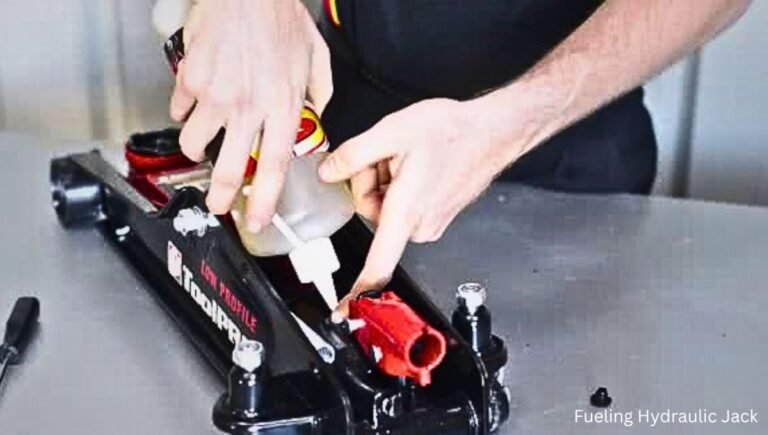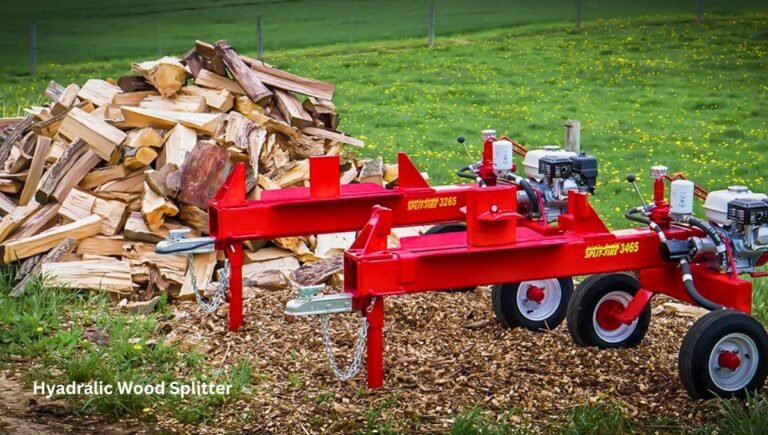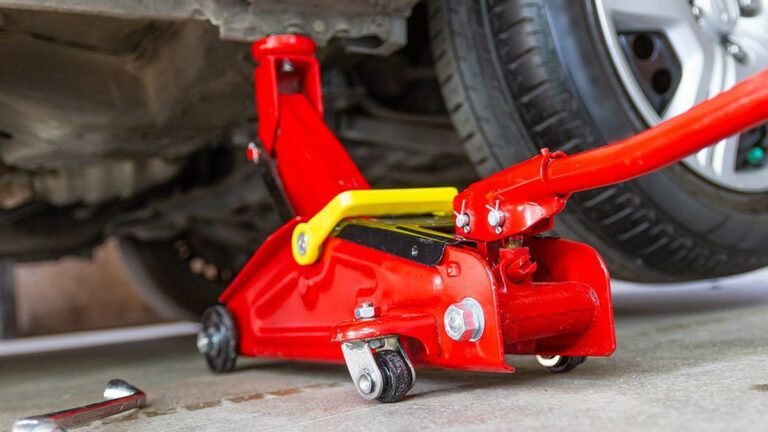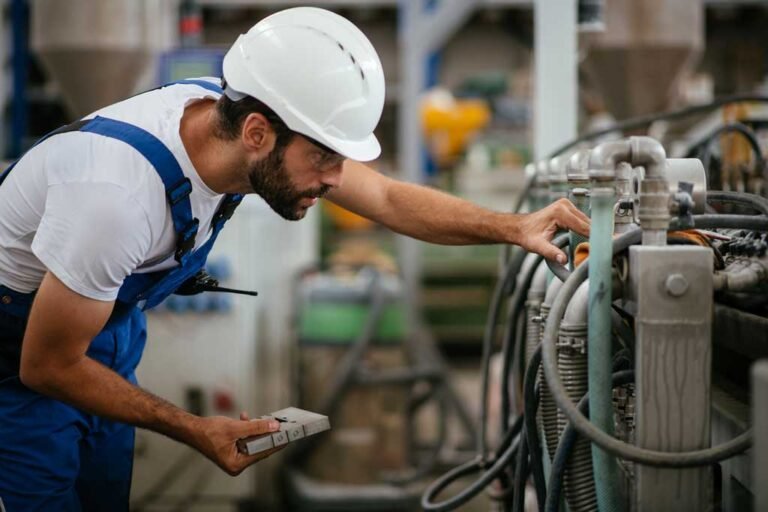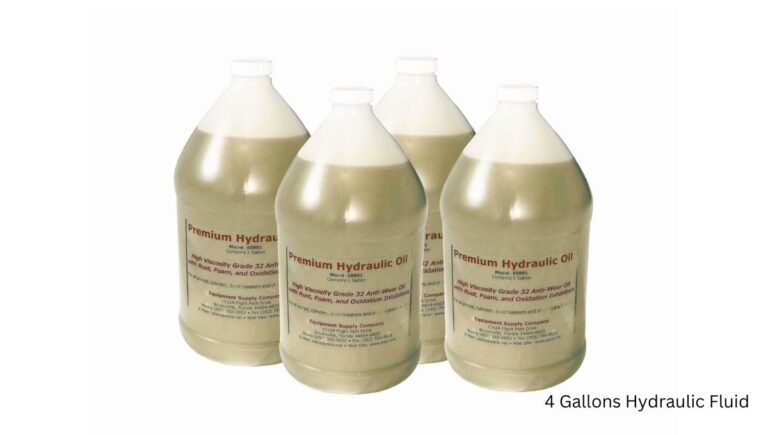How Do Hydraulic Trailer Brakes Work? Ultimate Guide
Hydraulic trailer brakes work using fluid pressure to activate the braking mechanism. The system ensures efficient and responsive stopping power.
Hydraulic trailer brakes operate through a hydraulic fluid system, which connects the trailer’s brake lines to the towing vehicle’s master cylinder. This setup creates a seamless braking experience by using the towing vehicle’s brake pedal to apply pressure to the trailer brakes.
As a result, hydraulic trailer brakes offer superior control and safety, especially when hauling heavy loads. These brakes are essential for maintaining stability and preventing accidents during transit. Regular maintenance, including checking the hydraulic fluid levels and inspecting for leaks, ensures optimal performance and longevity of the braking system. This guide will help you understand and maintain your hydraulic trailer brakes effectively.
Introduction To Hydraulic Trailer Brakes
Hydraulic trailer brakes are essential for safe towing. They provide reliable stopping power. Understanding how they work can help you maintain them. Let’s explore their basics and importance.
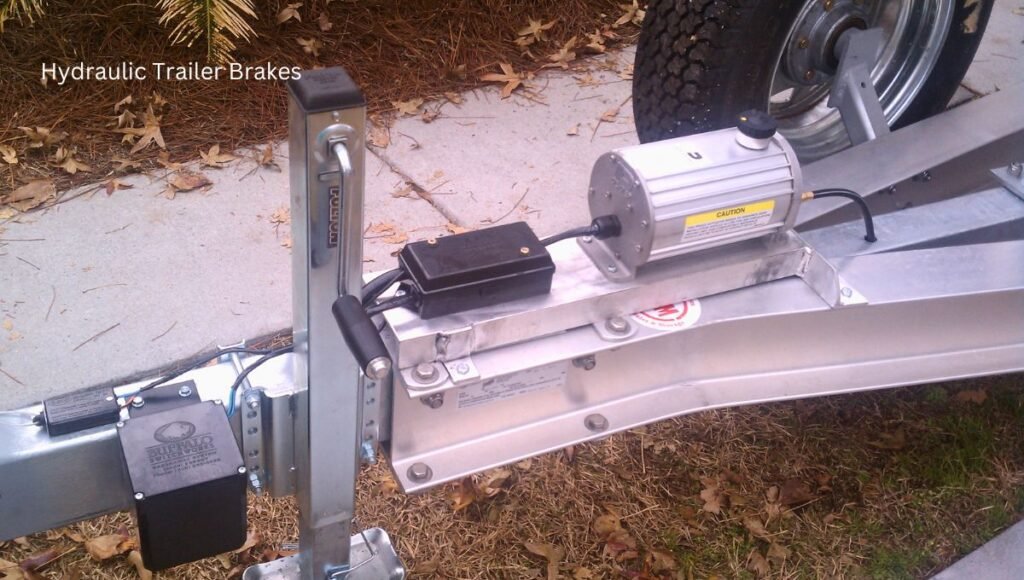
The Basics Of Hydraulic Braking Systems
Hydraulic trailer brakes work using fluid to transfer force. When you press the brake pedal, fluid moves through the brake lines. This action activates the brake pads. The pads then press against the brake rotors or drums. This friction slows down the trailer.
Key components of hydraulic brakes include:
- Master Cylinder: Pumps brake fluid into the system.
- Brake Lines: Carry brake fluid to the brake assemblies.
- Brake Pads: Apply pressure to rotors or drums.
- Brake Rotors or Drums: Create friction to stop the trailer.
Importance Of Hydraulic Brakes In Trailers
Hydraulic brakes are crucial for trailer safety. They offer consistent braking performance. This is especially important when towing heavy loads. Hydraulic brakes also adjust automatically. This ensures balanced braking for all wheels.
Benefits of hydraulic trailer brakes include:
- Reliable Stopping Power: Ensures safe and controlled stops.
- Automatic Adjustment: Keeps brakes balanced and effective.
- Less Maintenance: Fewer adjustments needed over time.
Using hydraulic brakes can enhance your towing experience. They make it safer and more reliable.
Components Of Hydraulic Trailer Brakes
Understanding the components of hydraulic trailer brakes is key for their maintenance. Each part plays a crucial role in the braking system. Let’s break down these components to see how they work together.
Master Cylinder Functionality
The master cylinder is the heart of the hydraulic brake system. It converts the force from the brake pedal into hydraulic pressure. When you press the brake pedal, it pushes a piston in the master cylinder. This action forces brake fluid through the brake lines. The master cylinder ensures that hydraulic pressure is distributed evenly.
Brake Lines And Fluid Dynamics
Brake lines are the pathways for the hydraulic fluid. They connect the master cylinder to the wheel cylinders. These lines must be free of air to function correctly. Hydraulic fluid travels through these lines, transmitting pressure from the master cylinder to the brakes at each wheel.
| Component | Function |
|---|---|
| Brake Lines | Carry hydraulic fluid from the master cylinder to the wheel cylinders |
| Hydraulic Fluid | Transmits pressure to activate the brakes |
Wheel Cylinders And Brake Shoes
Wheel cylinders are located at each wheel. They receive hydraulic pressure from the brake lines. This pressure pushes pistons in the wheel cylinders. These pistons then press the brake shoes against the brake drum. The friction created slows down or stops the trailer.
Brake shoes are crucial. They convert hydraulic pressure into mechanical force. They must be in good condition to ensure effective braking.
Hydraulic Brake Operation Principles
Hydraulic trailer brakes are essential for safe towing. They use fluid to transfer force from the brake pedal to the brake pads. Understanding how they work helps you maintain them better.
Pressure Transfer In Hydraulic Systems
In hydraulic systems, pressure is key. When you press the brake pedal, it creates pressure in the brake fluid. This pressure travels through the brake lines to the brake calipers.
Here’s a simple breakdown:
- Press the brake pedal.
- Brake fluid moves through the lines.
- Pressure reaches the brake calipers.
- Brake pads press against the rotors.
This pressure transfer ensures the trailer stops smoothly and safely.
Role Of Brake Fluid In Force Amplification
Brake fluid is vital for hydraulic brakes. It amplifies the force you apply to the brake pedal. This makes stopping easier and more effective.
Brake fluid has three main roles:
- Transmit force from the pedal to the brakes.
- Amplify the force applied by the driver.
- Lubricate the brake system and prevent corrosion.
Always check and replace brake fluid as needed. Clean brake fluid ensures the system works efficiently.
To summarize, hydraulic trailer brakes rely on pressure transfer and brake fluid. This combination ensures safe and effective stopping power.
Types Of Hydraulic Trailer Brake Systems
Hydraulic trailer brakes are essential for safe towing. They ensure efficient braking under various conditions. There are different types of hydraulic trailer brake systems. This section explores the two main types: surge brakes and electric over hydraulic brakes.
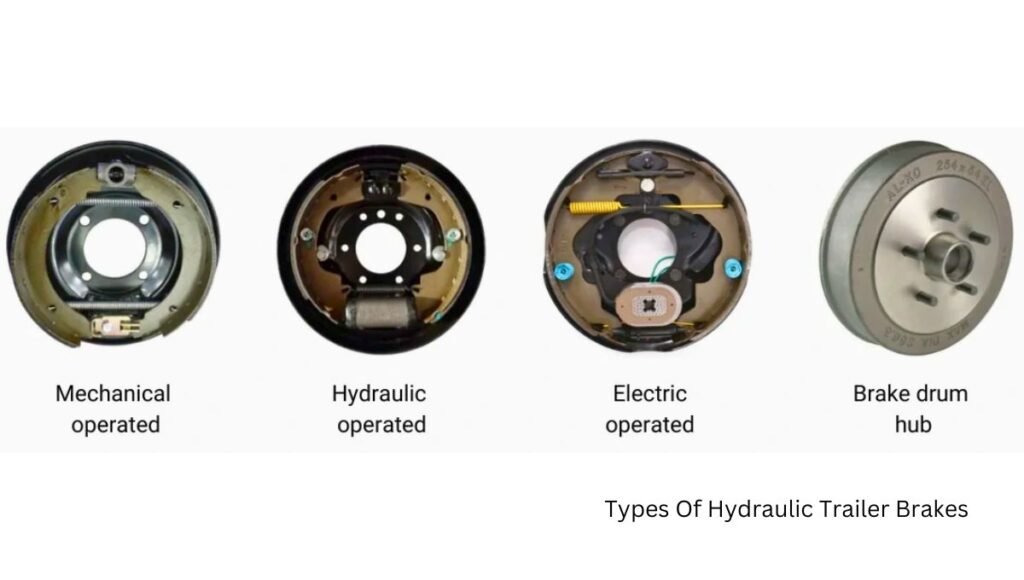
Surge Brakes And Their Mechanism
Surge brakes are self-contained systems. They do not need a brake controller. They use the trailer’s momentum to activate the brakes. When the tow vehicle slows, the trailer pushes against the hitch. This compresses a hydraulic cylinder. The pressure from the cylinder applies the brakes.
Here is how surge brakes work:
- The trailer moves forward when the tow vehicle slows down.
- The coupler compresses the hydraulic cylinder.
- The hydraulic pressure activates the brake shoes or pads.
- The trailer slows down smoothly.
Surge brakes are easy to maintain. They are ideal for boat trailers and other lightweight trailers.
Electric Over Hydraulic Brakes
Electric over hydraulic brakes combine electric signals with hydraulic power. They offer precise control and strong braking force. This system includes an electric actuator, hydraulic lines, and brake assemblies. The electric actuator receives signals from the brake controller in the tow vehicle.
Here are the steps in the process:
- The driver presses the brake pedal.
- The brake controller sends a signal to the electric actuator.
- The actuator converts the electric signal into hydraulic pressure.
- The hydraulic pressure activates the brake assemblies.
This type of braking system is suitable for larger trailers. It ensures smooth and reliable braking under heavy loads.
Both surge brakes and electric over hydraulic brakes have their advantages. Choosing the right system depends on the specific needs of your trailer.
Maintenance Tips For Hydraulic Brakes
Maintaining hydraulic trailer brakes ensures safety and prolongs their lifespan. Follow these tips to keep your hydraulic trailer brakes work in top condition.
Regular Inspection Intervals
Inspect the brakes every three months. Check for wear and tear on brake pads. Look for leaks in the hydraulic lines. Make sure all bolts and nuts are tight. Examine the brake fluid level in the reservoir.
Fluid Replacement And Bleeding Air
Replace the brake fluid every two years. Use the manufacturer-recommended brake fluid. Bleed the brake system to remove air bubbles. Air in the system can cause brake failure.
| Task | Interval |
|---|---|
| Inspect brake pads | Every 3 months |
| Check hydraulic lines | Every 3 months |
| Tighten bolts and nuts | Every 3 months |
| Replace brake fluid | Every 2 years |
| Bleed brake system | Every 2 years |
Proper maintenance of hydraulic trailer brakes is essential for safe towing. Follow these steps to ensure your brakes are always in optimal condition.
Troubleshooting Common Hydraulic Brake Issues
Hydraulic trailer brakes work positively for safe towing. Understanding their common issues can prevent accidents. This section covers the most frequent problems and how to fix them.
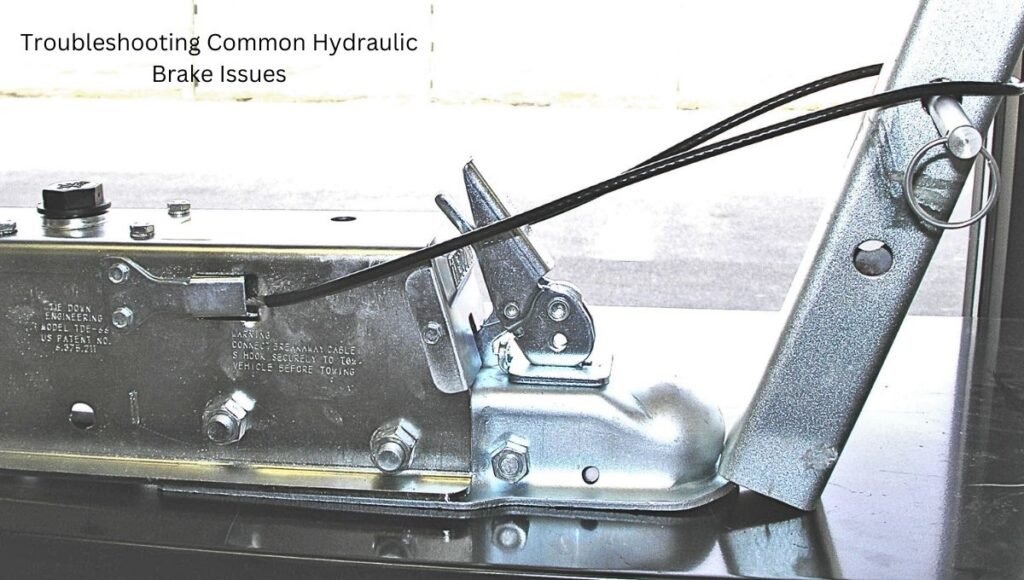
Identifying Symptoms Of Brake Failure
Recognizing brake failure symptoms is crucial. Common signs include:
- Spongy Brake Pedal: The pedal feels soft when pressed.
- Leaking Fluid: Brake fluid leaks near the wheel or master cylinder.
- Reduced Braking Power: The trailer takes longer to stop.
- Pulling to One Side: The trailer pulls to one side when braking.
These symptoms often indicate underlying issues. Prompt attention ensures safety.
Resolving Pressure Imbalance Problems
Pressure imbalance in hydraulic brakes can cause uneven braking. Here’s how to address it:
- Check for Leaks: Inspect all brake lines for leaks.
- Bleed the Brakes: Remove air from the brake lines.
- Adjust the Brake Shoes: Ensure even contact with the drum.
- Inspect the Master Cylinder: Check for proper fluid levels and function.
Addressing these steps ensures balanced braking pressure. This enhances overall safety.
Hydraulic Brakes Vs. Electric Brakes
Hydraulic trailer brakes and electric trailer brakes are two common types. Both have unique features. Understanding the differences helps in making an informed choice.
Comparing Performance And Reliability
Hydraulic brakes use brake fluid to create pressure. This pressure activates the braking system. They offer smooth and powerful braking.
Electric brakes use an electric current. This current activates a magnet. The magnet engages the brake shoes. Electric brakes are simpler and easier to maintain.
| Feature | Hydraulic Brakes | Electric Brakes |
|---|---|---|
| Performance | Powerful and smooth | Quick response |
| Reliability | Less prone to failure | Requires regular maintenance |
| Maintenance | More complex | Simple |
Decision Factors For Trailer Owners
When choosing between hydraulic and electric brakes, consider these factors:
- Cost: Electric brakes are generally cheaper.
- Usage: Hydraulic brakes suit heavy-duty trailers.
- Maintenance: Electric brakes need less maintenance.
Each type has its benefits. Your choice depends on your specific needs. Think about your trailer’s requirements and your budget.
Upgrading Your Trailer’s Brake System
Keeping your hydraulic trailer brakes work system updated is crucial. Hydraulic trailer brakes ensure safety and reliability. An upgrade can enhance performance and prevent accidents. Below, we’ll explore when to consider an upgrade and how to choose the right hydraulic brake kit.
When To Consider An Upgrade
Knowing when to upgrade is essential for your trailer’s safety. Consider an upgrade in these situations:
- Your current brakes show signs of wear and tear.
- You’re noticing longer stopping distances.
- Your trailer is carrying heavier loads than before.
- You’re traveling through mountainous or steep terrain.
Regular maintenance checks can help identify these issues. Don’t ignore unusual sounds or brake fluid leaks. These can signal the need for a brake system upgrade.
Choosing The Right Hydraulic Brake Kit
Selecting the right hydraulic brake kit involves several factors. Here’s what to consider:
- Compatibility: Ensure the kit matches your trailer’s make and model.
- Weight Capacity: Check the weight rating. It should suit your trailer’s load.
- Quality: Opt for kits from reputable manufacturers. Quality matters.
- Installation: Some kits are easier to install than others. Choose accordingly.
| Factor | Importance |
|---|---|
| Compatibility | High |
| Weight Capacity | Critical |
| Quality | High |
| Installation | Medium |
Choosing the right kit ensures optimal performance and longevity. Always read reviews and seek expert advice if unsure. Your trailer’s safety depends on a well-chosen brake system.
Safety Practices And Legal Considerations
Understanding safety practices and legal considerations is crucial for using hydraulic trailer brakes. This ensures not only your safety but also that of others on the road. Below, we will discuss compliance with transportation regulations and best practices for safe towing.
Compliance With Transportation Regulations
Each country has its own transportation regulations. Make sure to know and follow these rules.
Below is a table to help you understand some common regulations:
| Country | Regulation |
|---|---|
| USA | Trailers over 3,000 lbs must have brakes |
| Canada | Trailers over 1,360 kg must have brakes |
| UK | All trailers must have brakes if over 750 kg |
Ensure your trailer complies with these legal requirements. This keeps you safe and avoids fines.
Best Practices For Safe Towing
Always follow these best practices for safe towing:
- Check the trailer’s weight and balance.
- Inspect hydraulic brake systems regularly.
- Ensure your vehicle can handle the trailer’s weight.
- Drive at safe speeds and maintain distance.
- Use proper hitching methods.
Regular inspections are vital. Check the brake fluid and pads. Replace worn parts to avoid accidents.
Understanding and following these best practices ensures safer journeys. Always stay informed and vigilant while towing.
Optimizing Trailer Brake Performance
Optimizing hydraulic trailer brake performance ensures safe and efficient towing. Proper maintenance and understanding of the system are vital. This section provides key tips and future innovations in trailer braking technology.
Key Takeaways For Hydraulic Brake Maintenance
Regular maintenance keeps your hydraulic brakes in top condition. Here are some essential tasks:
- Inspect Brake Fluid: Check the brake fluid level monthly. Replace if dirty or low.
- Examine Brake Pads: Look for wear and tear. Replace worn pads promptly.
- Check for Leaks: Inspect hoses and connections for leaks. Fix leaks immediately.
- Test Brake Pressure: Ensure adequate brake pressure. Adjust as needed.
Following these steps improves braking efficiency and safety.
Future Innovations In Trailer Braking Technology
Trailer braking technology is evolving. New advancements aim to enhance safety and performance. Some promising innovations include:
| Innovation | Benefit |
|---|---|
| Wireless Brake Controllers | Reduces wiring complexity and improves response time. |
| Self-Adjusting Brakes | Maintains optimal brake performance automatically. |
| Advanced Brake Sensors | Provides real-time data for proactive maintenance. |
These innovations aim to make trailer braking more reliable and efficient.
What Are Hydraulic Trailer Brakes?
Hydraulic trailer brakes use fluid pressure to activate brake pads. This ensures smooth and effective braking. They are commonly used in trailers for safety.
How Do Hydraulic Trailer Brakes Engage?
When the towing vehicle brakes, fluid pressure from the master cylinder activates the trailer brakes. This fluid movement engages the brake pads.
Are Hydraulic Trailer Brakes Reliable?
Yes, hydraulic trailer brakes are reliable. They provide consistent and strong braking power. Regular maintenance ensures optimal performance.
What Fluid Is Used In Hydraulic Trailer Brakes?
Hydraulic trailer brakes use brake fluid. This fluid is specifically designed for hydraulic systems. Always use the recommended brake fluid type.
Conclusion
Understanding how hydraulic trailer brakes work is crucial for safe towing. They ensure controlled stops and prevent accidents. Regular maintenance keeps them functioning effectively. Investing time in learning about these systems pays off in road safety. Stay informed and keep your trailer brakes in top condition for peace of mind on every trip.
